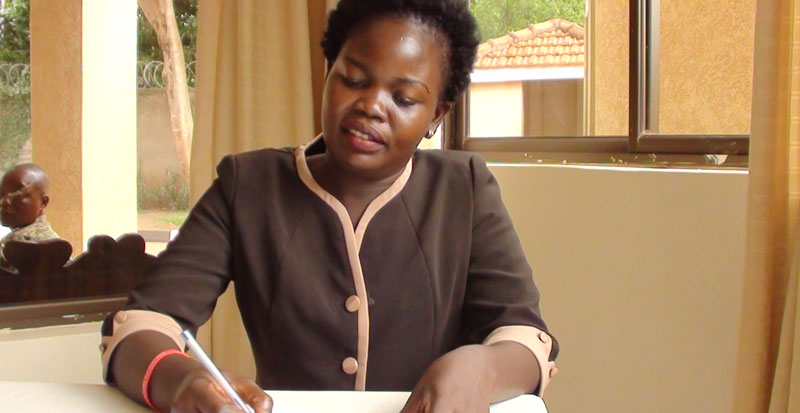Analysis
Acholi resorting to witchcraft to settle land rows
Judicial officers in Gulu High Court Circuit recently asked stakeholders and local leaders to sensitize the community on the benefits of mediation as a way to reduce case backlogs and hatred among the people of Acholi sub region.
The call comes at a time when the judicial officers in the sub-region are battling land conflicts which leaders say has stifled agricultural development in the region as most people spend a lot of time and resources fighting each other over land. Local leaders from the sub-region told The Sunrise that the huge backlog of cases has frustrated complainants forcing them to turn to witchcraft.
Speaking during an interface meeting between the formal and informal justice structures at Doves’ Nest Hotel in Gulu, the Grade one magistrate Selsa Biwaga advised the government to promote mediation as an alternative mechanism of dispute resolution and reduce the number of cases in the system.
“I have about 600 cases to hear and 90 percent of them are land-related. But there are people who come to court when they are very negative about mediation. We are supposed to hear at least one witness per case but you find a case having 10 witnesses. That means 10 adjournments. This causes delay in justice and a huge backlog for the judicial officers since we are few,” says Biwaga.
The meeting was organized by Action Aid Uganda, Gulu Cluster with support from Action Aid Australia and the Australian government. This is part of a 3-year project to enhance women’s rights to land, peace and justice in the districts of Amuru and Nwoya.
Gulu High court circuit has jurisdiction over all the 8 districts of Acholi sub-region but has only two Grade one magistrates handling civil cases at the Gulu court division.
Biwaga adds that such perceptions can only be handled through constant community outreach programs to educate people about how court processes may take long to deliver justice due to the lengthy procedures involved.
Biwaga further lamented that the formal court system may not favor the poor in attaining justice.
“A lot (of money) is paid in court which can be avoided through mediation. People who go through mediation are happier. So organizations and leaders should help sensitize on mediation. ”
Meanwhile, Matthew Otto, Kitgum district senior land management officer, says there is a ‘clash’ between the legal and traditional understanding of land which is causing conflict among the educated and the uneducated groups of people in Acholi.
“In customary land ownership (the most predominant land tenure system for the Acholi), land is owned by clans. However the definition of a clan is something abstract. For example, land in Acholi belongs to 3 categories of people; the living; the dead and the unborn. (This means) that in Acholi land is difficult to sell because who would sign as the owner?” Otto asserts.
Otto adds that although leaders in Acholi are promoting registration of Customary land to have documents, the Certificate of Customary ownership, it will only put Acholi land on market and breed more conflict.
“Certificate of Customary land Ownership is a World Bank Project. Why are leaders promoting what will make Acholi become landless since this is to enable Acholi land come to the market for anybody to buy from an individual.
In Acholi, no individual owns land but the clan. We just use the land and leave for those yet to be born. If Acholi sell all their land to aliens, shall we not become squatters?” Otto wondered.
He argues that the legal system that recognizes land sales in the name of an individual with a document is a concept causing confusion among the community because agreements are signed with ignorance.
Thomas Oloya, a resident of Amuru centre in Amuru district told the meeting that there are tricksters in the community who are surviving on the ignorance of locals to get money during land related conflicts.
“There are many trickster lawyers in the villages persuading people to go to court. We are treating insecurity in courts because people do not understand the court system and the language the lawyers use is too confusing for a lay man to understand.”
Oloya adds that some poor people are resorting to witchcraft and violence because they do not understand the court system and many land cases take too long to end yet land is the major source of production for the majority poor in the villages.
“Since 2006 when we started returning to the camps, court cases are not ending and people are killing each other. You find families, relatives, with spears and pangas, fighting because of land.”
“Have precedents in Acholi land matters because our tenure system is different and our culture operates differently from the West where most of the precedents in land matters are set,”
Patrick Okello Oryema, the Nwoya district chairman urged the judiciary to strengthen mediation as a strategy so that communities understand that even court allows mediation. He adds that the mediation processes should be strengthened from the grassroots by empowering the chiefs in the community who also have a vital role traditionally in mediating conflicts.
Oryema called for truth telling among elders for smooth mediation in land matters since they often act as key witnesses.
Mediation is an alternative dispute-resolution mechanism that allows parties entangled in a dispute find a quick solution with the assistance of a neutral third party.
The mediation programme as alternative process to resolution of cases started in 2013 with the hope of settling cases.
Comments



















